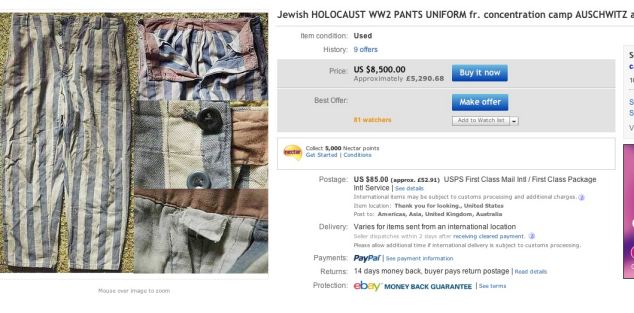As the 75th Anniversary of Kristallnacht approaches, Holocaust-related stories surface more often and resonate more deeply.? Of particular note is Ebay making Nazi artifacts available for sale. As the last survivors of the Holocaust perish, the ethics of memory — what this story is really about — becomes entirely our question to deal with.
This is a far more complicated issue than most people realize, even though I share most people’s initial revulsion at the crass commercialization of the Holocaust by turning tokens of unspeakable horror into high-end collectibles.
But because I know most things are more complicated than they first seem, I stop and consider how the commercialization of the Nazi genocide happens all of the time.
As the old, disturbing and accurate adage goes, there’s no business like Shoah (Hebrew for Holocaust) business. From Hollywood and TV, to the building of museums lead by people who became multi-millionaires from their work, profiting from the Shoah is hardly new. So isn’t Ebay just the digital e-commerce version of what we already tolerate and even celebrate? Ultimately despite the number of other examples, I have to say “no”.
However crass the other examples may be, they are at least open to public awareness and critique. People may be trading in, and profiting from, the Shoah, but we can all see what they are doing, evaluate its impact, and respond accordingly. With Ebay, that is not possible.
Are the sellers survivors who choose to dispose of these items this way, or simply dealers who would sell anything for a buck? Are the sold relics being used to fill educational displays in holocaust museums, or as fetish items by modern day Nazis? To me, it makes a real difference, as I think it should.
Ultimately, as it is with so many ethical issues, the issue is anonymity and accountability. With Ebay, unlike so many other examples of “Holocaust commerce”, there is too much of the former and not enough of the latter. Were the folks at Ebay able to address those issues, I might think otherwise. For now though, they should get out if this particular line of business.

Listed for many years in Newsweek as one of America’s “50 Most Influential Rabbis” and recognized as one of our nation’s leading “Preachers and Teachers,” by Beliefnet.com, Rabbi Brad Hirschfield serves as the President of Clal–The National Jewish Center for Learning and Leadership, a training institute, think tank, and resource center nurturing religious and intellectual pluralism within the Jewish community, and the wider world, preparing people to meet the biggest challenges we face in our increasingly polarized world.
An ordained Orthodox rabbi who studied for his PhD and taught at The Jewish Theological Seminary, he has also taught the University of Pennsylvania, where he directs an ongoing seminar, and American Jewish University. Rabbi Brad regularly teaches and consults for the US Army and United States Department of Defense, religious organizations — Jewish and Christian — including United Seminary (Methodist), Yeshivat Chovevei Torah (Modern Orthodox) Luther Seminary (Lutheran), and The Jewish Theological Seminary (Conservative) — civic organizations including No Labels, Odyssey Impact, and The Aspen Institute, numerous Jewish Federations, and a variety of communal and family foundations.
Hirschfield is the author and editor of numerous books, including You Don’t Have To Be Wrong For Me To Be Right: Finding Faith Without Fanaticism, writes a column for Religion News Service, and appears regularly on TV and radio in outlets ranging from The Washington Post to Fox News Channel. He is also the founder of the Stand and See Fellowship, which brings hundreds of Christian religious leaders to Israel, preparing them to address the increasing polarization around Middle East issues — and really all currently polarizing issues at home and abroad — with six words, “It’s more complicated than we know.”


Comments are closed.